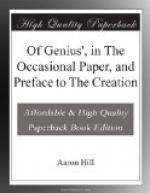Only when the admiration for such emotional and imaginative qualities should outweigh the desire for symmetrical form; when “primitive” literature should be preferred to Virgil and Horace; and when this preference should be joined with a belief in the diversity and fatality of literary bents—only then could the concept of original genius burst into full bloom.
In Aaron Hill’s preface to the paraphrase of Genesis, published in 1720, we find no preoccupation with the fatality of temperament and style. But we do find a rising discontent with the emptiness and restraint of much contemporary verse, and a very real preference for a more meaningful and a more emotional and imaginative poetry. We find, in fact, a genuine appreciation for the poetry of the Old Testament—a poetry which Biblical scholars like Le Clerc were already viewing as the product of untrained primitives.
Hill was not alone in his admiration for Biblical style, for the praise of the “unclassical” poetry of the Bible, which had begun in the Renaissance, had swelled rather than diminished during the neoclassical age. By the second decade of the 18th century such Augustans as Dennis, Gildon, and Pope were crying up its beauties. Not all agreed, of course, on just what those beauties were. And still less did they agree on the extent to which contemporary poetry should imitate them.
One thing upon which almost all would have agreed, however, was the adoption of the historical point of view in the approach to Hebrew poetry. Yet many of Hill’s predecessors had stopped short with the historical justification. Blackmore, for instance, had condemned as bigots and sectarians all those who denied that the Hebrew way was as great as the classical. He had pronounced it a mere accident of fate that modern poetry of Western Europe was modeled on that of Greece and Rome rather than on that of ancient Israel. But he had been perfectly willing to accept that fate—and to remodel the form and style of the book of Job on what he considered the pattern of the classical epic.
Hill is as far as most of his contemporaries from appreciating such a literal translation as the King James Version. On the other hand, he is one of a small group of critics who were beginning to see that at least certain aspects of Biblical style were of universal appeal; that they might be as effective psychologically for the modern Englishman as for the ancient Jew. And he sees in this collection of ancient Oriental literature a corrective for some of the worst tendencies of a degenerate contemporary poetry.




